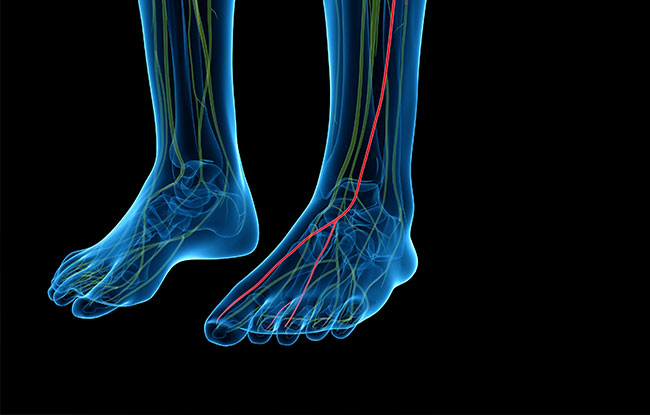Peripheral Neuropathy Capitola
Peripheral Neuropathy
Peripheral neuropathy is a condition that results from damage to your peripheral nerves, branching out from your brain to the spinal cord. The peripheral nervous system is a network of nerves that sends information from your brain and spinal cord (central nervous system) to all other parts of your body. Peripheral nerves send sensory information to the brain and spinal cord, such as a message that feet are cold. When there is damage to a nerve or a group of nerves, it causes interference with the normal functioning of the peripheral nervous system.
More than 100 different types of peripheral neuropathy exist, with every kind having its unique symptoms and specific treatments. Nerves are classified into:
- Sensory nerves: responsible for transmitting sensations such as pain and touch
- Motor nerves: responsible for controlling muscles
- Autonomic nerves: responsible for regulating automatic functions of the body, such as blood pressure and bladder function.
The symptoms of peripheral neuropathy vary based on the type of nerve affected, which may include tingling, pricking, or burning sensation, pain, muscle weakness, low blood pressure or abnormal heart rate, increased sensitivity to heat, and loss of bowel control.

What Causes Peripheral Neuropathy?
Peripheral neuropathy affects millions of Americans, with the most common cause being diabetes. Doctors don’t always know the exact cause of this condition. In rare cases, peripheral neuropathy is genetic. Many different conditions can lead to peripheral neuropathy, such as:
- Chronic kidney disease
- Injuries
- Infections
- Some kinds of cancer
- Guillain-Barre syndrome
- Some autoimmune disorders
- Chronic liver disease
- Excessive alcohol intake
- Vitamin deficiencies
- Certain medications
- Exposure to poisons
How is Peripheral Neuropathy Diagnosed?
The symptoms and body parts affected by peripheral neuropathy are so diverse that they may be hard to diagnose. Our doctor is committed to meeting patients' needs. It starts with a thorough assessment of your history along with a physical examination. Doctors conduct specific tests during the physical exam, such as testing for reflexes, sensation, and muscle strength to make a diagnosis.
If our doctor determines you may have symptoms, we may require blood work, diagnostic imaging, or nerve conduction test to help determine the underlying cause of your condition. Treatment depends entirely on the type of nerve damage, symptoms, and location. Once our doctor gets an accurate diagnosis, we can work with you to form a treatment plan that addresses the underlying cause of neuropathy, help reduce and manage symptoms and prevent further nerve damage. If you believe you may have peripheral neuropathy, then you may contact our office to schedule a consultation!
